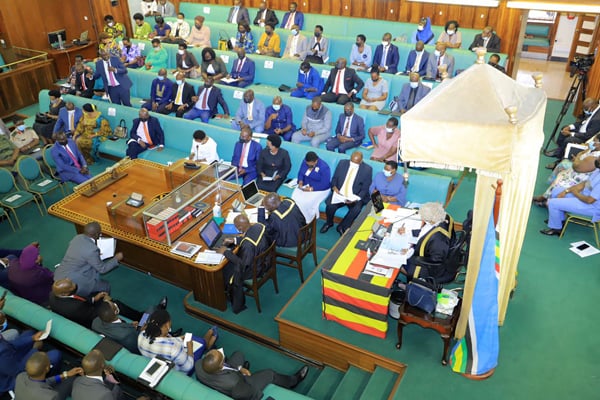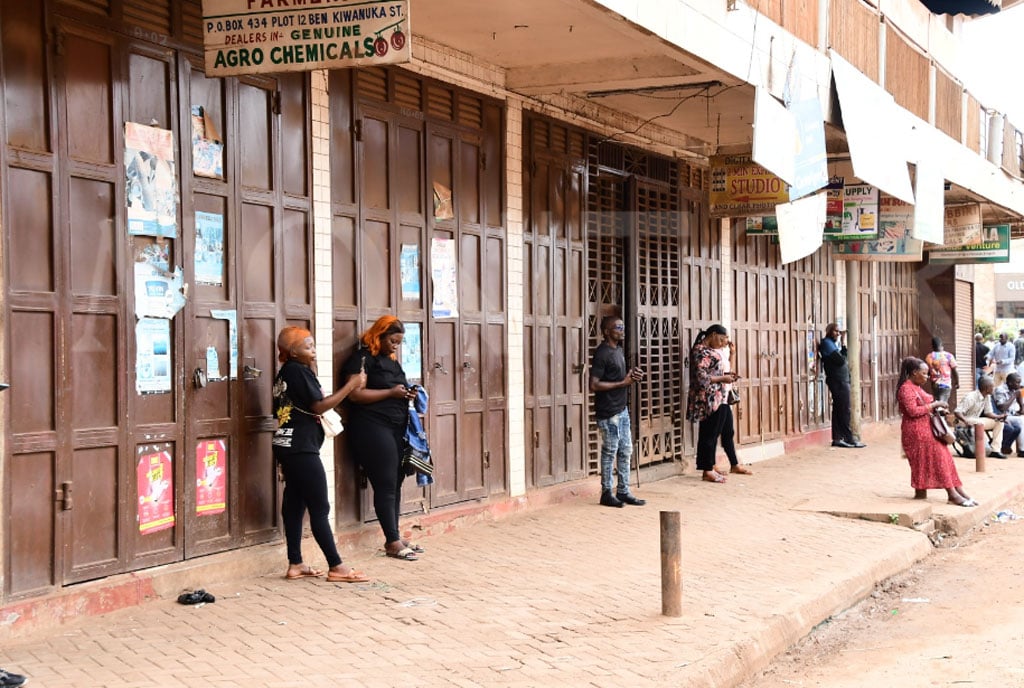Prime
Parliament spends Shs2.6 billion every day

President Museveni interacts with Parliament Speaker Anita Among and her deputy Thomas Tayebwa on June 7, 2023 ahead of the State of the Nation Address. PHOTO/PPU
What you need to know:
- Details of the draft budget show a marked increase in allocations to the offices of the Speaker of Parliament and Deputy by Shs5b and Shs4b, respectively, while that for the Leader of Opposition (LoP) dropped by Shs800m.
Uganda’s Parliament, which has 529 elected members and 577 technical staff, on average spends Shs2.6b daily, according to our analysis of the House’s budget for this and the past financial years.
The Parliamentary Commission revenue and expenditure estimates for the 2023/2024 financial year, which we have seen, indicate the allocations are up by Shs30.6b from 2022/2023 budget.
The Parliamentary Commission is the entity responsible for administration of the Legislature and the welfare of its members and employees and, among others, hires and fires staff and determines terms of service.
Details of the draft budget show a marked increase in allocations to the offices of the Speaker of Parliament and Deputy by Shs5b and Shs4b, respectively, while that for the Leader of Opposition (LoP) dropped by Shs800m.
In the past financial year, the budget of the Speaker’s Office was Shs8.2b, that of the Deputy Speaker’s Office was Shs7.4b, while LoP’s allocation was Shs4.4b.
The records show that the money assigned to run the Office of the Leader of Government Business, which is the alternate role of the Prime Minister, reduced by Shs1b to Shs2.9b.
Holding a Shs945.5b budget for the current financial year means the House of people’s representatives, whose core jobs include legislating, representation and oversight, on average spends Shs79b monthly.
This translates into Shs18.2b weekly or Shs2.6b daily, or Shs108m hourly expense.
Parliament approved the national budget in May 2023, but the amount of money it allocated to run its activities for a year remained under wraps until now.
Our publication of the budget details, which illuminates how taxpayers’ money is used for House business, comes in the wake of intense scrutiny of Parliament following a torrent of disclosures of confidential expenses on the microblogging site, X, by Agora Discourse.

President Museveni and wife Janet arrive for the National Budget reading at Kololo Ceremonial Grounds on June 14, 2022. The are accompanied by Speaker Anita Among (in black robes) and her deputy Thomas Tayebwa (in the back). PHOTOs/DAVID LUBOWA.
The entity which describes itself on its website as an “innovative digital activism platform … fostering … public accountability” is led by Ms Agather Atuhaire, a journalist-cum-lawyer-cum-activist.
The United States government on Monday honoured Ms Atuhaire, alongside other notable women, with the International Women of Courage award for her works, including the revelatory #UgandaParliamentExhibition.
The campaign which has been running for a week now has unearthed questionable spending allocations in billions of shillings in the name of Speaker Anita Among and appropriation of Shs1.7b in “service award” to outgone LoP Matthias Mpuuga and four parliamentary commissioners.
The quintet rewarded itself in May 2022, when just a year in office, raising questions on what exceptional achievement they registered in the twelve months to deserve the payout.
READ: Why State House budget has been swelling over the years
Mr Mpuuga has spurned calls by his National Unity Platform (NUP) party to resign as parliamentary commissioner, arguing that the impugned allocation was legally done and the context has been vulgarised by haters to achieve peculiar interests.

New details shared on the X handles of Agora Discourse and Ms Atuhaire early this week showed that Parliament money for official business was being passed for withdrawal through personal accounts of selected staff, a practice similar to what transpired at the Office of the Prime Minister in a scheme that led to bureaucrats spirting away in excess of Shs60b that donors pooled to rebuild war-scarred northern Uganda.
Monitor broke that story in 2012, leading to development partners freezing support to Uganda and a raft of public finance management reforms.
The Office of the Auditor General at the time found fault with the practice and experts we interviewed for this article characterise the transfer of taxpayers’ money through the personal bank accounts of government employees as irregular and in breach of the Public Finance Management Act.
However, Parliament Spokesman Chris Obore while featuring in an X space conversation hosted by Agora on Tuesday, defended the manner of the disbursements and accused the exhibitors of exaggerating or falsifying figures to discredit the Speaker instead of looking at the bigger picture.
“If a mere Member of Parliament donates to his people in their constituencies, what of the Speaker? I don’t want to condemn Anita (Among) for investing in her community, yet there are other leaders who have looted the government more but did nothing,” he said.
His comments were in response to a document that Ms Atuhaire shared on X, formerly Twitter, earlier in the day capturing an apparent Shs2.5b disbursements in several tranches through the personal bank account of two employees.
We have not independently verified the document or the claims against the parliamentary staff. The authenticity of what Ms Atuhaire said was a printout from the Integrated Financial Management Information System (IFMIS), the official portal of government financial transactions, was a subject of dispute during the space conversations.
Mr Obore said the figures captured on the document were higher than those known to him and that allocations for donations by Parliament and the Speaker as well as corporate social responsibility spends are channeled through some Parliament staff.
He, however, did not provide alternative Integrated Financial Management Information Systems (IFMIS) data to debunk the one shared by Agora Discourse despite the moderator, Mr Haggai Matsiko, Ms Atuhaire, and others asking.
The donations kitty, according to documents this publication has seen, is Shs4.9b, up from Shs2.8b of the previous year.

MPs during plenary session recently. PHOTO/ FILE
Our analysis shows the current Parliamentary Commission budget (Vote 104) bankrolls what broadly is called the legislation, oversight, and representation programme, following Uganda’s shift from sector to programme budgeting.
The details show that parliamentary affairs is taking Shs627b, general administration and support to Parliament (Shs267b) and corporate affairs (Shs49b).
Of these monies, Shs595b is being spent on salaries and wages of staff, up from Shs590b in the previous year.
An item labelled “social contributions”, which by other sources is the alternate name for donations, are costing the taxpayer Shs53.5b, which is an increment of Shs500m from the previous year. Shs77b is being spent on general goods and services up from Shs48.2b in the previous year.
Parliament is spending Shs3.5b on communication, the same figure in the past financial year, while utilities and property expenses gross Shs15.4b. There is another provision of Shs1.2b on supplies and services.
The allocation for professional services has been slashed from Shs821m to Shs782m this year while travel and travel and transport expenses will cost Shs92.9b, down from Shs100.6b.
Maintaining the Parliament Building is costing Shs12.6b.
Reaching out about these allocations, Parliament Spokesman Obore said the increments and decrements are determined by the need during the budgeting cycle.
“That is the normal budgeting process. Each of those departments has heads who sit down and plan for their departments and in the normal process we allocate money to departments depending on their needs, activities, and urgencies,” he said.
The allocation for salaries and wages, he noted, had to automatically go up due to new staff hires.
Mr Obore said reduced allocations for certain departments may be revised upwards in the next budgeting cycle, subject to needs and resource envelope, citing a time when the expenditure of the Information, Communication and Technology (ICT) department went up when the House procured laptops for legislators.
“The increment and decrease [in allocation] is determined by the activity at place and its urgency,” he added.
Further breakdown of the budget shows that Shs14.2b was allocated to grants for inter-organisations, Shs848b on employment-related social benefits, Shs67.4b on acquisition of produced assets, and a classified Shs5.8b on current transfers.
The total recurrent expenditures on the general administration and support to Parliament is Shs200.5b. Of this, the general administration and support to Parliament was allocated Shs191b, up from Shs187b, the Office of the Clerk to Parliament was allocated Shs2.6b, down from Shs3.2b in the previous year, and the Parliamentary Commission Secretariat budget was maintained at Shs6.7b.
Legislation
In the programme of legislation, the Committee Affairs budget was reduced by Shs100m to Shs45b, Clerks’ department cash went down to Shs1.8b down from Shs2.1b.

The Department of Legislative and Procedure’s budget increased to Shs2.2b from Shs1.8b, the Department of Official Report reduced from Shs3b to Shs1.1b, litigation and compliance from Shs2.4b to Shs2b.
The offices of the Speaker, her Deputy, the Leader of Government Business (LOGB), the Budget Office and that of the Parliamentary Research Services operate on a recurrent budget of Shs32.3b, up from Shs24.7b that was spent in 2022/2023 financial year.
A further breakdown shows that Shs143m has been allocated for the Speaker’s beddings, clothing, footwear, and related services, the travel expenses are budgeted at Shs6.6b (Shs1.3b inland, Shs5.3b overseas trips). This is up from the Shs3.3b assigned on the item in the previous year.
Deputy Speaker
Of the Shs11.3b that was allocated to the Office of the Deputy Speaker which is currently being held by Mr Tayebwa, Shs922m is for advertising and public relations, Shs70m for workshops, meetings and seminars, Shs495m for staff training, Shs455m for welfare and entertainment and Shs16.8m for ICT services.
Others are Shs9.6m for property management expenses, Shs117.1m for beddings, clothing, footwear and related services, Shs5.6b for inland and overseas travels, and Shs1.7b for donations.
Leader of Government Business
The budget document shows that Prime Minister Robinah Nabanja, as the leader of government business in Parliament, was allocated Shs10m for advertising and public relations, Shs199m for workshops, meetings and seminars, Shs405m for staff training, and Shs153m for welfare and entertainment
Shs2.2b has been budgeted for the Leader of Government Business for trips within and outside Uganda. Incapacity and funeral expenses for the trio has each been assigned a modest Shs4.8m, although Parliament has a separate budget line for the burial of its members.
LoP Office
The Department of the Leader of Opposition, whose new occupant is Mr Joel Ssenyonyi, has been allocated Shs3.6b, down from Shs4.4b the previous year.
Of this, Shs1b is for casual, temporary and sitting allowances. The Office is also spending Shs24m on advertising and public relations, Shs84.4m on meetings, workshops and seminars, Shs320m on staff training, Shs119m on welfare and entertainment, Shs11m on beddings and clothing.
The LoP’s travels both within and outside Uganda is budgeted to cost Shs1.9b.

Speaker Anita Among
When asked about why the LOP’s budget was revised downwards when allocations to the Speaker and the Deputy went up, Parliament Spokesman Obore said “each office has a director and each director plans the activities which are funded”.
“They don’t just allocate money. Budgeting is not a constant figure; the funding is done according to each department’s plan and the activity’s urgency,” he added.
Explaining Among’s power play in Bukedea
Parliament budget
The offices of the Speaker, her Deputy, the Leader of Government Business (LOGB), the Budget Office and that of the Parliamentary Research Services operate on a recurrent budget of Shs32.3b, up from Shs24.7b that was spent in 2022/2023 financial year.
A further breakdown shows that Shs143m has been allocated for the Speaker’s beddings, clothing, footwear, and related services, the travel expenses are budgeted at Shs6.6b (Shs1.3b inland, Shs5.3b overseas trips). This is up from the Shs3.3b assigned on the item in the previous year.




